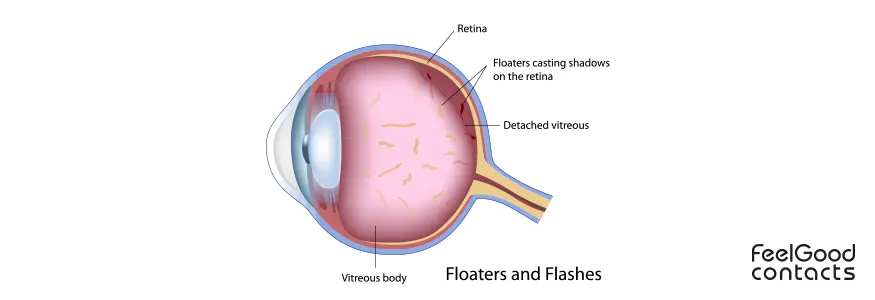Eye floaters are little spots on your visual field that appear like dark specks, threads, or web-like structures caused by advancing age. Flashes, however, appear as sparks of light that may occur in the visual field. In this article, we will talk about floaters and flashes, their causes, symptoms and best-available treatment options.
What are eye floaters and flashes?
Eye floaters are small structures that appear like black or grey spots, strings or cobweb-like structures in your visual field. These might result from age-related changes in the white jelly-like substance within your eyes called vitreous body. The vitreous body changes with age and sometimes strands can form. Collagen fibres develop, casting a shadow on your retina, creating black floaters in your eyes. If you look at these spots directly, they tend to drift away.
Flashes, on the other hand, are like streaks of bright light you might see in your visual field. These flashes may appear in your eyes for weeks or even months. This happens when the vitreous body rubs or pulls on the retina of your eyes.
As people age, it is common to see floaters and flashes occasionally. If you notice a sudden increase in black floaters in your eyes, you should seek advice from an eye care specialist immediately.

What causes eye floaters and flashes?
Eye floaters and flashes can appear on your visual field due to changes in the vitreous body within the eyes. It can occur due to ageing or various underlying eye conditions:
- Posterior Vitreous Detachment (PVD) is the most common cause of flashes and floaters. It occurs when the vitreous pulls away from the retina.
- Retinal detachment is a serious condition and requires urgent medical attention. It occurs when the retina separates from the back layer of the eye.
- High myopia can increase the chances of seeing floaters.
- Eye injuries or inflammation to the retina or vitreous can cause an increase in flashes or floaters.
What are the symptoms of eye floaters and flashes?
Some common symptoms of eye floaters include seeing small dark spots or lines that move across your vision. When moving around fast, you may not be able to notice them. If you are looking at a bright sky or bright white wall, you are more likely to see them.
The image below shows what it might be like to see floaters in a clear blue sky.

Symptoms for eye flashes appear as sudden flashes of light. This can be in one or both eyes and can come and go.
How to get rid of eye floaters and flashes?
According to the NHS, eye floaters or flashes of light in your vision are common. They tend to become less noticeable over time, as you get used to them. If floaters are obstructing your vision, your eye care professional may consider the following treatment options:
- Vitrectomy: a surgical procedure that involves removing the vitreous along with the floating particles and replacing it with a solution to maintain the eye shape
- Vitreolysis: a laser treatment used to break down the floaters and make them less visible
How to reduce floaters in eyes naturally?
Eye floaters are generally harmless, although you could maintain your eye health naturally with a few common tips:
- Floaters in the eyes can result from diabetic retinopathy. A healthy and balanced diet is essential to control your blood sugar levels
- Include leafy vegetables and proteins in your daily diet that have lutein as well as omega-3 fatty acids, as this can reduce the risk of certain eye diseases
- Attend regular eye tests, even if you think your eyesight is normal. A comprehensive eye test can help to identify any early signs or symptoms
- Consider wearing wrap sunglasses, especially while being outdoors on bright days. This will make the floaters appear less noticeable
It is important to see your eye care professional if you experience a sudden change in eye floaters or flashing lights in your vision. You should also seek medical advice immediately if you see a curtain effect or black shadows in your vision.
Quick Links:
A guide to retinal detachment
A guide to cataracts
A guide to eye infections
Disclaimer: The advice in this article is for informational purposes only and does not replace medical care or an in-person check-up. Please check with an eyecare professional before purchasing any products or remedies. For information on our article review process, please refer to our Editorial Policy.

 Offers
Offers Account
Account
 Favorite
Favorite
 Basket
Basket

 OFFERS
OFFERS


















